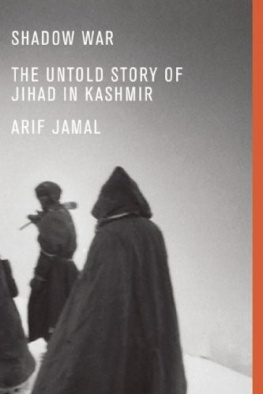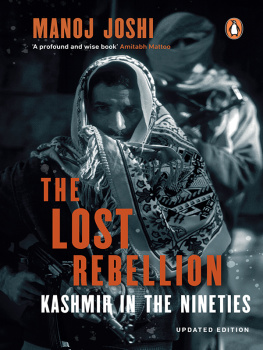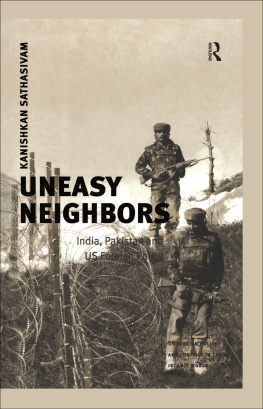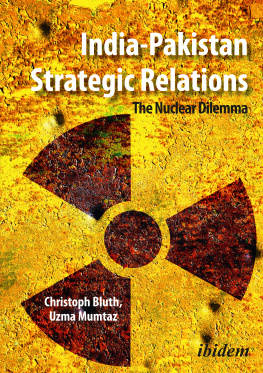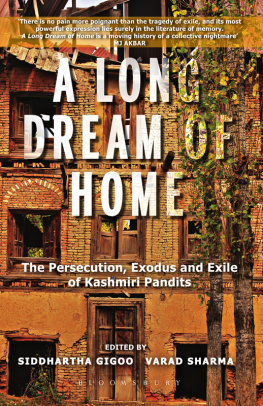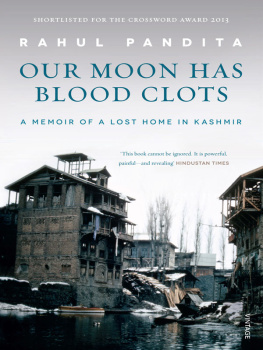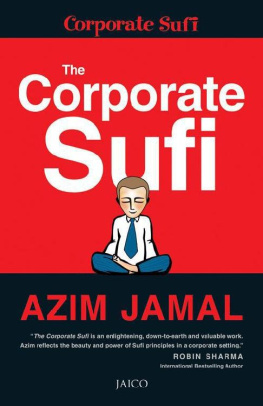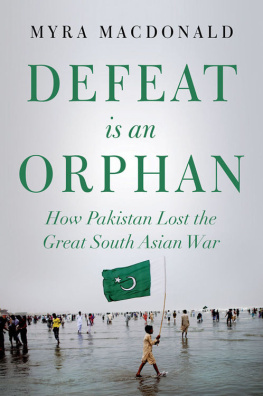| Shadow War: The Untold Story of Jihad in Kashmir |
| Arif Jamal |
| Melville House Publishing (2012) |
|
| Tags: | India, Kashmir, Jihad |
| Indiattt Kashmirttt Jihadttt |
Adefinitive history of the Kashmiri conflict by one of Pakistan's leading reporters
For nearly sixty years, India and Pakistan have battled over the territory of Kashmir. The two nuclear-armed states have fought three bloody wars in the region, but the countries have also fought in the shadows.
Having interviewed a thousand militants in war-torn Kashmir, Arif Jamal presents a news-breaking account of Pakistan's secret battles with India. From the early 1980s, when the Kashmiri conflict lurked in the background of the CIA's proxy war in Afghanistan, to the eruption of insurgent violence in 1988, to recent Kashmiri connections to terrorist financing and training, Jamal brings much to light.
Jamal reveals that the Pakistani military has trained nearly half a million insurgents and, as a matter of defense policy, continued the conflict at great human cost. He also shows how CIA money destined for the Afghan mujahideen was funneled to Kashmiri jihadis, leading to a twenty-year insurgency rarely discussed in Western media.
SHADOW WAR
SHADOW WAR
The Untold Story of Jihad in Kashmir
ARIF JAMAL
A MELVILLEHOUSE
BROOKLYN, NEW YORK
To Nadia
and Vali
whose time 1 stole to write this book
SHADOW WAR
2009 Arif Jamal
Melville House Publishing
145 Plymouth Street
Brooklyn, NY 11201
www.mhpbooks.com
ISBN: 978-1-933633-59-6
First Melville House Printing: April 2009
Map courtesy of the UN Department of Peacekeeping Operations, Cartographic Section: Map No. 3953 Rev. 3, October 2005.
Book design: Kelly Blair
Library of Congress Control Number: 2009925116
TABLE OF CONTENTS
6 Map
7 Principal Characters
11 Preface
21 The Making of a Dispute
59 The Politics of Plebiscite
105 Prelude to Jihad
131 The Rise Of Hizbul Mujahideen
161 How the Jihad Was Waged
179 War in the Open
205 Jihad and Diplomacy
241 A Political Face
273 Notes
PRINCIPAL CHARACTERS IN KASHMIR
FAROOQ ABDULLAH, chief minister of Jammu and Kashmir, 1982-1984; 1986-1990; 1996-2002.
SHAIKH MOHAMMAD ABDULLAH, the lion of Kashmir, and arguably the most important political figure in modern Kashmiri history. Early member of the Reading Room Party, the All India Kashmir Muslim Conference, and the Jammu and Kashmir National Conference. Later head of the Emergency Administration, prime minister, and chief minister of Jammu and Kashmir. ASIYA ANDRABI, leader of Dukhtaran-i-Millat.
MAULANA ABDUL BARI, founding amir of Jamat-i-Islami of Azad Jammu and Kashmir.
HILAL AHMED BEG, the head of Jammu and Kashmir Students Liberation Front, the JKSLF.
MAQBOOL BHAT, an early Kashmiri fighter with the JKLF. AHSAN DAR, an early militant who founded Hizbul Mujahideen.
ABDUL MAJEED DAR, chief operational commander of Hizbul Mujahideen.
SAADUD DIN, the founding amir of the Jamat-i-Islami of Indian-controlled Kashmir.
MIRWAIZ UMAR FAROOQ, a moderate leader of the Hurryyat Conference.
SYED ALI SHAH GEELANI, an important Jamat-i-Islami member and the undisputed secessionist leader in Jammu and Kashmir. DR. FAROOQ HAIDER, vice president of the JKLF and the NLF. AMANULLAH KHAN, leader of Plebiscite Front (for Azad Kashmir and Pakistan) and the founder of the JKLF.
ABDUL GHANI LONE, a moderate leader of the Hurryyat Conference. YASIN MALIK, a JKLF fighter and chief of his own faction of the JKLF.
HILAL AHMED MIR, founder of Ansarul Islam.
HAKEEM GHULAM NABI, appointed amir of Jamat-i-Islami of Indian-controlled Kashmir in 1988; retired in 1995.
GHULAM NABI NOWSHEHRI, vice amir of the Jamat-i-Islami of Indian-controlled Kashmir.
MASOOD SARFRAZ, an early Jamat-i-Islami member and a founder of Hizbul Mujahideen.
YUSUF SHAH, alias Syed Salahuddin, amir and then supreme commander of Hizbul Mujahideen.
HARI SINGH, the last ruling maharaja of the princely state of Jammu and Kashmir.
GHULAB SINGH, acquired the Valley of Kashmir from the British in 1846, adding it to his other territories, which included Ladakh, Jammu, and Gilgit-Baltistan.
ABDUR RASHID TURABIB, amir of the Jamat-i-Islami of Pakistani-controlled Kashmir.
IN PAKISTAN
BENAZIR BHUTTO, prime minister, 1988-1990 and 1993-1996.
ZULFIKAR ALI BHUTTO, foreign minister, 1963-1966; prime minister, 1963-1966; and president, 19711973.
ZAFARULLAH KHAN JAMALI, prime minister, 2002-2004. MOHAMMAD ALI JINNAH, first governor-general of Pakistan, 1947-1948.
COLONEL AKBAR KHAN, later a major general, architect of the 1947 jihad under his nom de guerre of General Tariq. His plans for jihad in Kashmir are still used by the ISI.
AYUB KHAN, commander in chief of the Pakistan Army, 19511958; prime minister October 1958; and president, 1958-1969. LIAQUAT ALI KHAN, the first prime minister of Pakistan, 19471951.
YAHYA KHAN, commander in chief of the Pakistan Army and president, 1969-1971.
PERVEZ MUSHARRAF, chief of the army staff 1998-2007; chief executive 1999-2002; president 2001-2008.
NAWAZ SHARIF, prime minister, November 1980-April 1993; May-June 1993; and February 1997-October 1999.
MOHAMMAD ZIA-UL-HAQ, chief of the army staff, 1976-1988; president 1978-1988.
IN INDIA
JAWAHARLAL NEHRU, the first prime minister of India, 19471964.
LAL BAHADUR SHASTRI, prime minister, 1964-1966.
V.P. SINGH, prime minister, 1989-1990.
ATAL BIHARI VAJPAYEE, prime minister of India, May 1996-June 1996; March 1998-May 2004.
PREFACE
On the evening of November 26, 2008, dinghies carrying at least ten men landed in Mumbai, India. The men were carrying large backpacks, each stuffed with dried fruit, grenades, an AK-47 rifle, some 200 rounds of ammunition, and a satellite phone. Four days earlier, the group had departed from the harbor of Karachi, the largest city in Pakistan. Two of them, Mohammad Amir Ajmal Qasab and Ismail Khan, the leader of the group, landed in the Budh-war Park neighborhood of Mumbai. They calmly walked past a crowd of fisherman, but few noticed themeveryone was busy watching a cricket match. There, the men hailed a cab and traveled to central Mumbai, to the VT rail station, where they arrived at approximately 9:20 p.m. Once inside the rail station, they opened fire, aiming precisely but shooting randomly, killing fifty-eight people and injuring more than one hundred.
Qasab and Khan then left the station, in search of hostages and other targets. They entered the Cama and Al-bless Hospital, but, finding no hostages, quickly left. As they were leaving, they encountered a police car containing three senior police officials. Shots were fired, and Qasab was wounded in the hand. But Khan shot and killed the three officers, and the two took off inside the police car. Sometime later, they were stopped at a police checkpoint. Khan was killed in a shootout that followed, but Indian police apprehended Qasab.
The two were part of a sophisticated series of attacks: Their group had struck eleven targets throughout Mumbai, including the Taj and Oberoi hotels. Members of the group held the hotels hostage for nearly sixty hours, eventually setting them on fire. In all, they killed 183 people, including twenty-two foreigners, in one of the worst terrorist attacks in Indian history.

